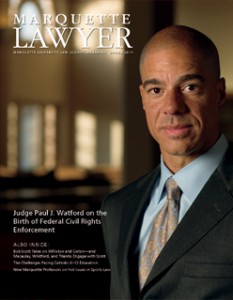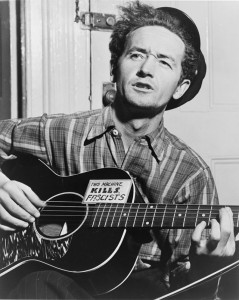New Marquette Lawyer magazine takes long-term view of major issues
The long-term view: That’s a theme that underlies much of the content in the just-released Spring 2015 issue of Marquette Lawyer magazine. The way events and trends that date back decades shed light on major issues today is at the heart of several of the feature articles in the magazine.

That is especially true of the cover story, “Screws v. United States and the Birth of Federal Civil Rights Enforcement,” an essay version of Marquette Law School’s 2014 E. Harold Hallows Lecture by Judge Paul J. Watford of the U.S. Court of Appeals for the Ninth Circuit. Watford recounts the history behind a 1945 U.S. Supreme Court decision which opened the way for more widely known landmark decisions on civil rights. Accompanying the article is a commentary piece by John J. Pauly, Gretchen and Cyril Colnik Chair in the Marquette University Diederich College of Communication, and Janice S. Welburn, dean of university libraries at Marquette University.
A November 2014 conference at the Law School on the state of kindergarten through twelfth-grade Catholic schools, both nationwide and in Milwaukee, is the basis of “Much to Preserve—and Much to Change: The Challenges Facing Catholic K-12 Education,” by Alan J. Borsuk, senior fellow in law and public policy at the Law School. The article reports on the decline in enrollment in Catholic schools, going back to the 1960s, and current efforts to reverse that trend.
Columbia Law School’s Robert E. Scott, a leading expert on contract law, proposes a path for navigating different theories of contract law in “Contract Design and the Goldilocks Problem,” a print version of his 2014 Robert F. Boden Lecture at Eckstein Hall. Scott analyzes the interpretive approaches, going back decades, of contract law titans Samuel Williston (focused on text)and Arthur Corbin (emphasizing context) and suggests a middle path. The magazine includes reactions to Scott’s approach from George Triantis of Stanford Law School; Victor A. Lazzaretti, L’93, of Emerson Electric Co. in St. Louis; Nadelle E. Grossman of Marquette Law School; and Stewart Macaulay and William C. Whitford of the University of Wisconsin Law School.
The magazine includes excerpts from nine articles by Law School faculty members in the current issue of the Marquette Sports Law Review. Each excerpt focuses on an aspect of the interaction between law and the world of sports. The nine professors are Michael K. McChrystal, Nadelle E. Grossman, Matthew J. Mitten, Kali N. Murray, Chad M. Oldfather, Judith McMullen, Edward A. Fallone, Jay E. Grenig, and Lisa A. Mazzie.
Dean Joseph D. Kearney takes a long-term view of the Legal Aid Society of Milwaukee, including the Law School’s involvement with the society’s work, in remarks that he made at a Legal Aid Society event.
The magazine begins with the dean’s column and law school news and concludes with the Class Notes section, including extended profiles of several accomplished Marquette lawyers: Jessica Poliner, L’06; Tim Reardon, L’88; R. L. McNeely, L’94; and Daniel Chudnow, L’84.
The full magazine may be found by clicking here.


